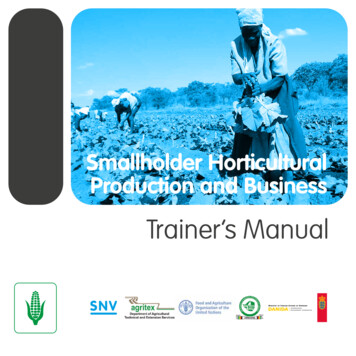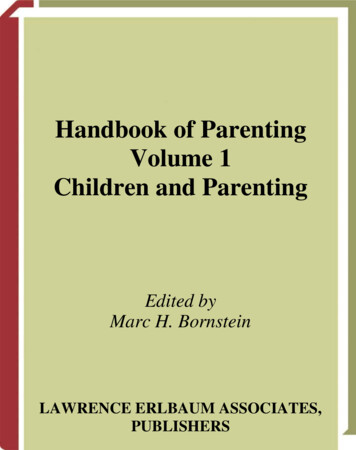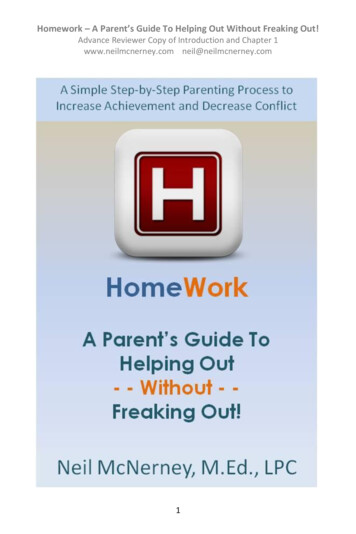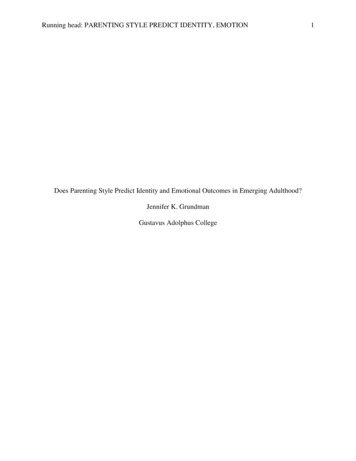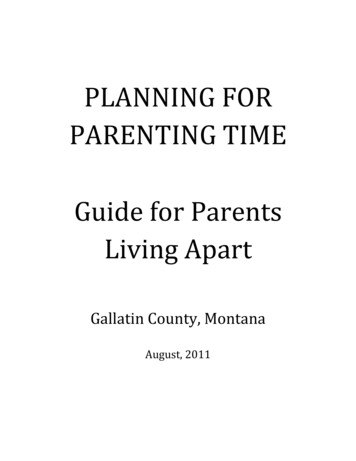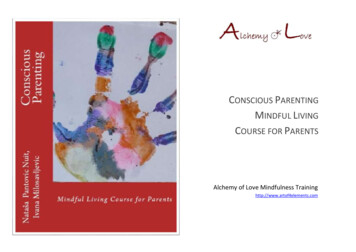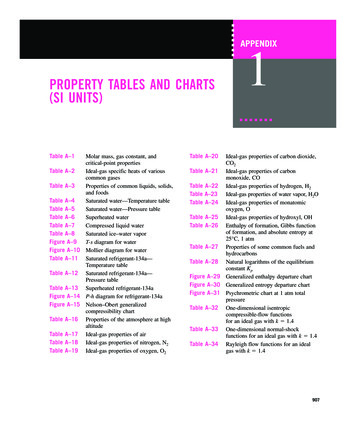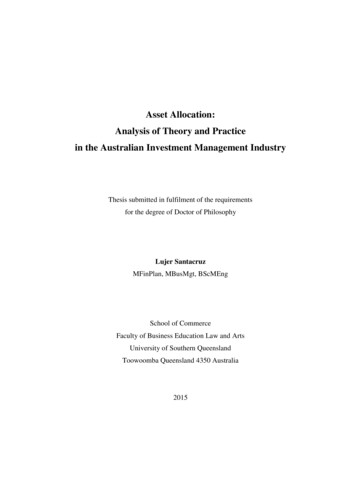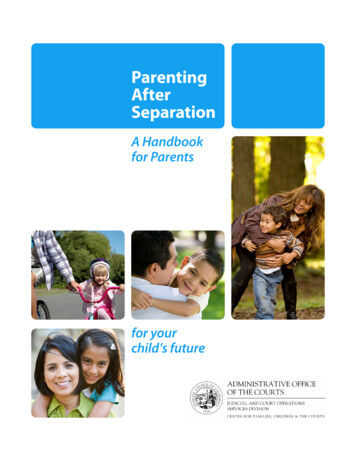
Transcription
Table of ContentsA Handbook for Parents . 7Introduction . 7Who this handbook is for . 7Abuse and safety issues . 8The Experience of Separating for Adults . 9Separation: A process that occurs over time . 9Emotions of separating . 9Stages of separating . 10Tasks of separating for adults . 11A time to plan where to go from here . 12Worksheet 1: Looking to the future: A self-assessment . 13The Experience of Separating for Children . 16What children often experience . 16What children most want to know . 17How children often respond . 18What children need to hear . 22What children do not need to hear . 23How to tell the children . 23How parents can help children deal with the separation . 24When to get professional help for your children. 25Checklist: Best help for children of any age . 26Tips for children: Surviving your parents’ separation . 27Worksheet 2: Focusing on my child. 28You and the Other Parent. 29Games some parents play. 30Dealing with the other parent, where safety issues are not involved . 31Tips on how to be businesslike when communicating with the other parent . 32Pitfalls to watch for in informal negotiations . 32Negotiating informally with the other parent . 33Worksheet 3: Practicing Positive Communication Skills . 342
Resolving Legal Issues . 36In the best interest of the child. 36Parenting arrangements . 37Child support . 40Child Support Guidelines . 41How to decide on a parenting plan. 46Option 1: You and the other parent can agree . 46Option 2: You can get help to reach an agreement . 48Option 3: You can get a lawyer to help you negotiate an agreement or represent you in court. 52Option 4: You can go to court . 53Checklist: Choosing a lawyer. 54Choosing a lawyer . 54Working with your lawyer. 55How to complain about a lawyer . 55Changing court orders and agreements . 56Worksheet 4: Parenting plan . 57Resources . 61Recommended Reading . 61Worksheet 5: Life after separation: Ways parents cope . 62Acknowledgments . 633
Parenting after SeparationThis handbook focuses on the needs of children when parents separate and how you can help meetthose needs.Your children need your love and support throughout the separation, which is a difficult time forthem. They also need your love and support through the post-separation years, as your familyadjusts to a new life.4
Judicial Council of CaliforniaAdministrative Office of the CourtsCenter for Families, Children & the Courts455 Golden Gate AvenueSan Francisco, California 94102-3688www.courts.ca.govCopyright 2014 by Judicial Council of California/Administrative Office of the Courts. All rightsreserved.Except as permitted under the Copyright Act of 1976 and as otherwise expressly provided herein,no part of this publication may be reproduced in any form or by any means, electronic, online, ormechanical, including the use of information storage and retrieval systems, without permission inwriting from the copyright holder. Permission is hereby granted to nonprofit institutions toreproduce and distribute this publication for educational purposes if the copies are distributed at orbelow cost and credit the copyright holder.For more information on the Parenting after Separation Handbook or to view this handbook andother materials online, please visit www.courts.ca.gov/selfhelp-custody.htm andwww.familieschange.ca.gov. To order copies of the handbook, please call 415-865-7739.5
Judicial Council of CaliforniaAdministrative Office of the CourtsChief Justice Tani Cantil-SakauyeChair of the Judicial CouncilHon. Steven JahrAdministrative Director of the CourtsCurtis ChildChief Operating OfficerCenter for Families, Children & the CourtsDiane NunnDirectorCharlene DepnerAssistant DirectorBonnie Rose HoughManaging AttorneyJulia WeberSupervising AttorneyCarolynn BernabeSenior Administrative Coordinator6
A Handbook for ParentsIntroductionThe process of ending a relationship is a challenging one for parents. It can mean: developing new parenting arrangements; helping your children make a positive adjustment; dealing with your own emotions; and/or making legal decisions in the best interests of the children.This handbook provides information about: how children experience the process of separation and how you can help them; how parents experience the process of separation; how you can have a healthy parenting relationship with your children; and what to do when safety issues are involved.It also looks at: what options are available for making decisions; how you may be able to use mediation (in some courts, referred to as child custodyrecommending counseling); what the Child Support Guidelines are and how they apply; what to expect when you go to court; and where to get more information and help.This handbook gives you tools to work with. You may wish to use the handbook over time, ratherthan going through it all at once. The worksheets at the end of each chapter provide an opportunityfor self-reflection and help you plan the next steps.Who this handbook is forYou may be: married; living together; or have never lived with the other parent.You may have already left the relationship or just be thinking about it. This handbook is also forfamily and friends who have a relationship with the children.7
Parenting after SeparationAbuse and safety issuesIf one parent has been abusive toward the other parent or a child, it is very important to have aparenting plan in place that will help everyone stay safe. If you feel your safety or your children’ssafety is at risk, making sure you and your children are safe is the number one priority. You maywant to talk with a lawyer to find out the best legal way for you to proceed.If you are afraid for your and your children’s safety, contact 911 or call the National DomesticViolence Hotline at 1-800-799-7233 (1-800-787-3224 (TTY)).They will refer you to services near you. You may need to talk to a lawyer. Pages 36-39 of thishandbook describe arrangements for parenting time that can be agreed upon or ordered to protectyou and your children.All adults have the responsibility to protect children from being victims of abuse or witnessingongoing violence. Some strategies for effective parenting that we describe in this handbook mayNOT be appropriate in your situation.Many peopledescribe theprocess ofseparation asbeing like layersof an onion.8
The Experience of Separating for AdultsOur ability to hear our children’s point of view is improved when we acknowledge our ownemotional experiences of separation and try to understand them. When we are aware of what’shappening with us, we can better help our children.Separation: A process that occurs over timeSeparation is a process that begins long before couples actually separate. With separation, adultsexperience loss at many levels. On one level, we lose the person we were once involved with. Atanother level, we lose the hopes or dreams we had for the relationship with that person.Researchers have found that in most cases it takes about two years to fully recover from aseparation and that the process of recovery is similar to the grieving process.Understanding our emotional experience during the process of separating helps us understandwhat our children are experiencing. We must realize that they, too, are going through their ownseparate grieving process.Deciding to separateThe decision to separate is probably one you did not make quickly or easily.Often, couples try repeatedly to make the relationship work before deciding to end it. In the end,most couples do not come to a mutual decision to separate. Usually one person is more ready totake the final step than the other person.Emotions of separatingEveryone who separates from a partner experiences many different types of emotions.You may feel sad, depressed, anxious, angry, happy, relieved, guilty and ashamed. Parents thathave separated say that they experience more than one emotion and that their emotions areunpredictable. You may feel happy and relieved in the morning, but angry and hurt in theafternoon. Many people experience feeling shaky and vulnerable.Feelings do not cause behaviorWe have no choice about what we feel, but we do have a choice about how we act on thosefeelings. We can choose to respond in ways that help the children make a positive adjustment.How you handle your own feelings and how you relate to the other parent will affect how well yourchildren adjust to the separation.Example: If you can be aware that you are feeling depressed/angry/upset, you can choose what todo about it. You may choose to call on a friend or relative to help out with the role of parentingwhile you take some time to deal with your emotions.9
Parenting after SeparationStages of separatingThe stages of separation are a lot like thestages of grief. We are grieving for the end ofthe family as we have known it.Usually a person who separates goes throughfour psychological stages of loss and grief:1. ShockWhen we are overwhelmed by strongemotions, our brain has a protectivemechanism that shuts down feelings.People in this stage usually say they feelnothing or they feel numb and anxious.2. AngerThe numbness disappears and the feelings return. We may feel anger, resentment and anxiety.We ask: how can this be happening?3. TransitionThis is a period of confusion and mixed emotions. In this stage, we review the relationship andwhat went wrong. We may try to persuade the other person to come back. We may tellourselves that if only we had done (or not done) certain things, the relationship would havecontinued.People say they feel like they are on a roller coaster. One minute they feel relieved and certain.The next minute they feel sad and uncertain.This is the stage when we begin to make the psychological shift from being part of a couple tobeing a single person again.4. AcceptanceIn this stage, we have accepted the separation. We may have established a working relationshipwith our former partner and we are moving forward in a new life.Important: Not all people go through the stages in this order. Also, some people go through the stagesin six months, while others may take less time or may take much longer. Some go through the stagesbefore they even separate. Some go back and forth through the stages as they work through theseparation process.10
The Experience of Separating for AdultsTasks of separating for adultsBeing able to identify your tasks helps you to separate them from the tasks your children face. Ithelps you distinguish between couple issues and parenting issues.1. Acknowledging the lossIt is important to acknowledge and express sadness over the loss of your partner, as well as theend of hopes and dreams for the relationship. A loss that is not mourned can result in apreoccupation with your former partner’s life.2. Reclaiming yourselfThis involves separating yourself from the relationship and establishing a new sense ofself-identity. It is the move from ―we‖ to ―I.‖ It helps to remember the strengths you hadbefore the relationship. It also helps to reach out to trusted friends and family members. Youmay wish to take advantage of counseling to help sort out your feelings. You need to take careof yourself physically, as well as emotionally.3. Resolving anger/resentmentSeparation can bring on feelings that can affect you for years. Emotional flashbacks or bitterfeelings can be stirred up when you see your former partner or hear about what they are doing.It is important to resolve anger and resentment in a healthy way in order to move on. Whenanger continues, the children can be harmed by being used as weapons.4. Dealing with changes in your other relationships There may be changes in the way yourelate to friends you had as a couple and in your former partner’s extended family.5. Dealing with financesIt is likely that your finances are going to change upon separation. If necessary, seek financialcounseling. You may have immediate concerns for how to deal with the loss of the additionalincome from the other person and you may need assistance to develop a different long-termfinancial plan.6. Gaining new confidence, venturing forth againThis task involves finding the courage to try new relationships and new roles.7. RebuildingThis task builds upon the others. The goal is to create a new, sustained relationship or to have asatisfying life as a single person.11
Parenting after SeparationA time to plan where to go from hereSeparation is a major change in your life. It can also be a time to plan where to go from here. Withcourage and determination, you can make this an opportunity for you and the children to learnabout yourselves in a new way and to emerge stronger and more resilient than before.Take a look at Worksheet #1, ―Looking to the future: A self-assessment.‖ It starts on page 13. Thisis a tool that gives you an opportunity to review your life and plan your goals. You should plan tocomplete the worksheet in your own time.It may help to know that you are not alone. In the United States, over 40 per cent of all familiesexperience separation. See Worksheet #5 on page 62 for some of the ways other parents havelearned to cope.A Note on AngerIt is understandable that both parents experience anger. However, if at any time you feel physicallythreatened by your partner, it is important to ensure your own safety and the safety of the children.Consider contacting the National Domestic Violence Hotline for assistance at 1-800-799-7233 or1-800-787-3224 (TTY).12
Worksheet 1: Looking to the future: A self-assessmentThis worksheet can help you get a clear idea of where you are in the process of separating. It canalso help you plan your next steps and move forward.Consider the following questions and think about rebuilding your life.Who I wasHow did I see myself in the relationship? Did I rely on my former partner to tell me who I was? Did I do too many things for their approval?What have I learned from the relationship:1.2.3.4.5.13
Looking to the future: A self-assessmentWhere I am nowThink about the stages of separating this chapter has described (shock, anger, transition andacceptance).Then reflect upon your own reactions over the past week. Where would you place yourself withinthese stages?Think about the tasks of separating, outlined on page 11.Then reflect on where you are in the process of working through these tasks.Where I am with:Acknowledging the lossReclaiming myselfResolving my anger/resentmentDealing with changes in my other relationshipsDealing with my financesGaining new confidence, venturing forth againRebuilding14
Looking to the future: A self-assessmentThink of some things that you can consciously choose to do in answer to the question: where do Igo from here?I can:Who I wish to beWhat are my goals, visions, dreams for the future?What are my values?How do I see myself growing?Contract with myselfI will review this worksheet in (weeks’/months’ time) and compare where I am in my processof dealing with the stages of grief and the tasks of separating.15
The Experience of Separating for ChildrenHow will this affect my children?One of the most difficult questions parents have when deciding to separate is, ―How will this affectmy children?‖This chapter provides information about the experience of separation from the child’s point ofview. It suggests some strategies you may find useful to help your children through this time ofdifficult change.What children often experienceChildren often experience anger, sadness, rejection and guilt after parents separate. All of theseemotions are confusing. They may also experience emotions such as relief, which they then feelguilty about.Like adults, children experience stages of loss and grief as part of the separation process. Theyoften experience these emotions in the following stages:Stage 1:Denial. My parents will get back together again.Stage 2:Anger. How can you do this to me? You let me down. If you really loved me, youwould stay together.Stage 3:Bargaining. If I am really good, maybe you will get back together again.Stage 4:Depression. I feel empty inside and nothing can make it go away.Stage 5:Acceptance. My parents are not going to get back together. It’s okay that myfriends know my parents aren’t together anymore.As with adults, children may not go through these stages in any particular order and the time theprocess takes varies from child to child.Children’s worst fears I did something wrong and that is why my parents are separating. It’s my fault. If my parents loved each other before and now they don’t, they might stop loving me, too.16
Parenting after SeparationWhat children most want to knowResearch and the experience of professionals over the past 20 yearstell us what children of separated parents most want to know: My parents will continue to love me. My parents will stop fighting. Both of my parents will be here in my life. If I can’t have that, at least one of my parents will be here in my life.17
The Experience of Separating for ChildrenHow children often respondIn general: Pre-schoolers focus on security. Elementary school children show depression and/or anger. Junior high school students ask why, what is going on? High school students question the validity of relationships and commitment.You can use the following checklists to help you understand what to expect from your child andtheir responses to your separation. You may wish to check off ―Problem‖ or ―No Problem‖ beside―What to watch for.‖A. Infants (0 to 18 months)Issues consistency of caregivers, environment and routine emotional connection with caregiver nurturing and loveProblemWhat to watch for sleeping changes eating changes clingy behavior/difficulty separating What you can do to help maintain consistency in people and routines change routines gradually avoid angry expressions and emotional outbursts in front of the baby don’t fight in front of the baby18NoProblem
Parenting after SeparationB. Toddlers (18 months to 3 years)Issues consistency of caregivers, environment and routine fear absent parent has disappeared nurturing and love concern about security (who will take care of me?)ProblemWhat to watch for increased crying trouble getting to sleep/nightmares demanding to be fed by parent instead of feeding self changes in toilet habits increased anger (such as temper tantrums and hitting) clinging to adults or security objects NoProblem What you can do to help give love and affection provide verbal assurance ( both parents say, ―I love you‖) maintain consistency of people and routines reassure the child they will be cared for provide a clear and simple explanation of changes allow the child to express feelings through words or play avoid angry expressions or emotional outbursts in front of the child avoid fighting in front of the childC. Pre-schoolers (3 to 5 years)Issues fear of being abandoned/rejected doubts they are lovable (did my parents leave because I’m not good enough?) blame themselves for what happened (did I cause this because I was bad?)ProblemNo ProblemWhat to watch for going back to younger sleeping/eating/talking behaviorclingy behavior/difficulty with separationincreased angerincreased passivity (over-compliance)19
The Experience of Separating for ChildrenWhat you can do to help give love and affection provide verbal assurance ( both parents say, ―I love you‖) maintain consistency of people and routines reassure the child they will be cared for and that the separation is not their fault provide a clear and simple explanation of changes that are to occur in the child’s new life provide opportunities for the child to express feelings through words or play avoid angry expressions or emotional outbursts in front of the child avoid fighting in front of the childD. Young school-age children (6 to 8 years)Issues longing for absent parent dreaming about parents getting back together feeling the need to take the side of one parent concern about parent’s well-being guilt that they are responsible for the separationWhat to watch forProblem sadness, grief, crying, sobbing, withdrawalfear of losing relationship with parentfear of losing order in their livesfeelings of being deprived or left outanger and increased aggressiondifficulty playing and having funNoProblem [Type a quote from the document or the summary of an interesting point. You can position the text boxWhatyoucan do toUsehelpanywherein thedocument.the Text Box Tools tab to change the formatting of the pull quote text box.] assure them with words that their parents will continue to take care of themassure them they will continue to see both parents (if this is the case)give the child permission to love the other parentdon’t criticize the other parent in front of the childdon’t put the child ―in the middle‖ (see ―Games some parents play,‖ page 30)20
Parenting after SeparationE. Older school-age children (9 to 12 years)Issues may see things as black and white: one parent is right, the other is wrong may feel shame or embarrassment about parents’ separation may feel the separation threatens their own identity may feel need to overcome a sense of powerlessness may feel loyalty conflictsProblem NoProblem What to watch for physical complaints (headache, fatigue, stomach ache) intense anger, especially at parent they see as to blame taking one parent’s side against the other difficulty with peers difficulty playing and having funWhat you can do to help listen to child’s feelings and complaints without taking sides or judging don’t criticize the other parent to the child encourage the child to see good in the other parent avoid fighting in front of the child say positive things about the other parent don’t pressure the child to take sides or make the child feel like they have to take sides support the child’s contact with the other parent (if this is possible and safe to do so)F. Teens (13 to 18 years)Issues upset that parents may be unable to provide needed support and limitsalready difficult relationship with parent may worsenpremature or increased independencemay be asked to assume more responsibilities at home that pull them away from peersProblemWhat to watch for school problems, such as difficulty concentrating, fatigue acting out emotional distress through sex, drugs, crime internalizing emotional distress: depression anxiety over close relationships grief over loss of family and childhood becoming distant and aloof from family21 NoProblem
The Experience of Separating for ChildrenWhat you can you do to help provide opportunities for teens to share feelings,concerns, complaints without judging them avoid relying on teens for emotional support,remember you are the parent and they are the child don’t pressure teens to choose sides say positive things about the other parent allow teens to have appropriate friendship and peeractivitiesAt the end of this chapter, see Worksheet #2, ―Focusing on my child.‖ Use the worksheet to thinkabout how your children are adjusting and how you can assist them if they are having problems.What children need to hearTelling the children may be the most painful part of the entire separation process.Here are some statements you may find useful. These are statements that parents might maketogether or separately. If you are speaking to your children without the other parent, you can adaptthe statements to fit your discussion with the children.Some of these statements may not be appropriate if you have concerns about your safety. We will continue to take care of you and provide for you and keep you safe.While our feelings for each other have changed, the special relationship we have with you asour child will go on forever.Your relationship with your sisters and brothers, grandparents and other relatives will continue.Sometimes, though, these relationships change.You did not cause the separation. Nobody thinks you did.The separation is not your fault.The separation was not an easy decision to make. We put a lot of effort into making ourrelationship work, but we have decided that we can no longer live together.When we married/began living together, we loved each other and believed things would workout.We will honor your wishes, but we will decide where you will live. You don’t have to makethat decision.We are not going to ask you to take sides.You may wish we’d get back together again. Children often wish for that and it’s a naturalthing to want, but it’s not going to happen. We have separated.We are very sorry for the hurt this decision is causing you.We will never stop loving you. Never.22
Parenting after SeparationWhat children do not need to hear The separation is the other parent’s fault. Don’t give children the message that you are the goodone and the other parent is the bad
Parenting after Separation This handbook focuses on the needs of children when parents separate and how you can help meet those needs. Your children need your love and support throughout the separation, which is a difficult time for them. They also need your love and support through the post-separation years, as your family adjusts to a new life.
